MercoPress. South Atlantic News Agency
Tag: UK interest rates
-
Tuesday, July 15th 2025 - 06:39 UTC
Bank of England ready to make larger interest rate cuts if UK economy shows signs of slowing down
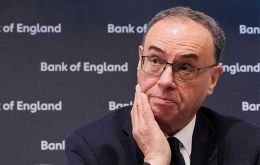
The Bank of England is prepared to make larger interest rate cuts if the job market shows signs of slowing down, Governor Andrew Bailey told The Times in an interview. “I really do believe the path is downward” on interest rates, Mr Bailey was quoted..
-
Friday, November 8th 2024 - 19:17 UTC
Bank of England cut the key interest rate to 4.75%, but anticipates a more cautious approach to further trims
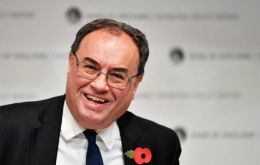
The Bank of England in an almost unanimous decision cut interest rates by 25 basis points on Thursday, a boost relief for mortgage holders, but also raised its inflation forecast following on Labor’s government budget and global uncertainty, which most probably conditions future policy easing.
-
Thursday, August 9th 2018 - 06:38 UTC
Pound falls below US$ 1.29 for the first time in almost a year
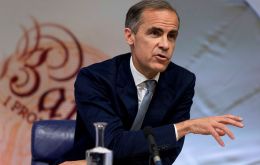
The pound has fallen below US$1.29 for the first time in almost a year on continuing worries Britain will leave the EU without a trade deal. Sterling also hit a nine-month low against the euro, and was down against the yen and Swiss franc.
-
Saturday, May 26th 2018 - 08:39 UTC
Brexit talks in Brussels lead to strong exchanges with Chancellor Hammond
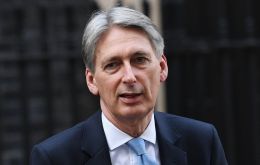
Chancellor Philip Hammond has criticized claims from European Union officials that Britain has a “fantasy” approach to Brexit negotiations. Mr Hammond insisted that talks with EU officials were “constructive” after reports from the continent that Britain was being “unrealistic” and little progress made in discussions in recent days.
-
Friday, May 11th 2018 - 06:12 UTC
Bank of England leaves interest rates unchanged, slashes 2018 growth prospects
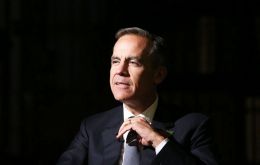
The Bank of England has backed off from raising interest rates as it slashed 2018 growth forecasts, but said the economy would bounce back from a weather-hit “soft patch”. Policymakers kept the prospect of rate hikes firmly on the cards, although it sparked confusion over when the next increase may come.
-
Monday, April 23rd 2018 - 08:41 UTC
Bank of England likely to raise interest rates twice in 2018 and 2019
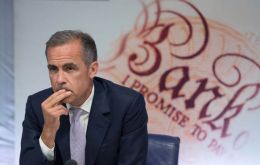
The Bank of England is likely to raise interest rates twice this year and twice in 2019, despite a sluggish economy, says a forecasting body. Bank governor Mark Carney has said a rate rise is “likely” this year, but any increases will be gradual.
-
Tuesday, April 17th 2018 - 07:54 UTC
Pound in strong sustained run against the US dollar
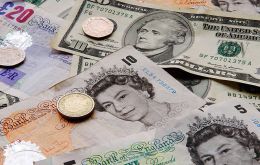
The pound has continued its recent strong run against the dollar pushing firmly above US$ 1.43. It is the seventh session in a row that the pound has made gains against the US currency. The strong run means that, among the G10 group of rich nations, the UK has the best-performing currency this year.
-
Friday, November 3rd 2017 - 07:37 UTC
Bank of England's first interest rate increase in a decade; Brexit impact hovers over future decisions

The Bank of England has raised interest rates for the first time in a decade to contain an increase in inflation stoked by the Brexit vote, in what is otherwise a moment of high uncertainty for the economy. In a statement Thursday, the bank said it had lifted its benchmark rate, which affects the cost of loans and savings rates in the wider economy, to 0.50% from the record low of 0.25%.
-
Tuesday, October 31st 2017 - 07:58 UTC
Uncertainty and inflation expected to make Bank of England reverse monetary policy

Bank of England is expected to reverse emergency action taken following the Brexit referendum, when it cut rates from 0.5% to 0.25% to avert a recession. While a slump has not materialized, the British economy appears in worse health than most other major countries, with potential to be blown further off course by faltering talks to leave the EU.
-
Friday, March 17th 2017 - 07:15 UTC
Bank of England cautiously leaves interest rates at the record low of 0.25%

The Bank of England (BOE) held interest rates at the record low level of 0.25% and maintained asset purchases at £435 billion on Thursday. The decision, which was made by an 8-1 majority, had been almost unanimously anticipated by central bank watchers with many expecting the BOE to choose caution until more clarity emerges on the Brexit process and the U.K. economy's capacity to manage outside of the European Union.
